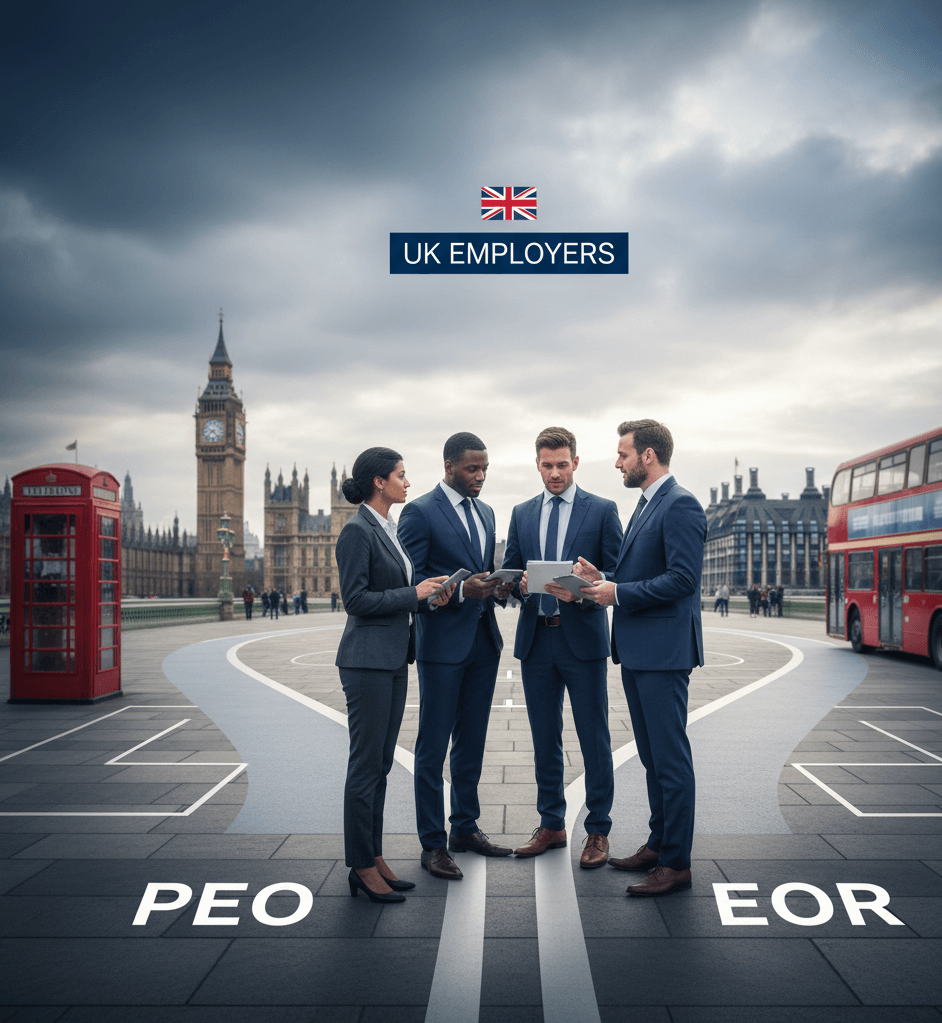Did you know that over 40% of UK businesses are now outsourcing HR functions to streamline operations amid rising compliance demands, with the market expected to exceed £10 billion by 2026? If you’re a UK employer wrestling with workforce management, understanding PEO vs EOR could unlock significant efficiencies.
Key Areas We Will Cover
In this detailed comparison of PEO vs EOR, we will explore essential aspects to help you make an informed choice:
- Definitions and core functions of PEO and EOR
- Key differences in employment models, liability, and setup requirements
- Pros and cons of each model for UK businesses
- Scenarios where PEO excels for domestic growth
- Common myths about transitioning, including challenges and misconceptions
Introduction
For UK employers seeking to optimise HR and payroll processes, the debate of PEO vs EOR is crucial in today’s dynamic business environment. A Professional Employer Organisation (PEO) focuses on co-employment to handle domestic administrative tasks, while an Employer of Record (EOR) enables seamless international hiring without local entities. This article delves into their differences, benefits, and when each suits your needs, empowering you to choose the right outsourcing model for sustainable growth and compliance in the UK.
Understanding PEO: Co-Employment for Streamlined HR
A PEO operates as a co-employer, sharing responsibilities with your business to manage HR functions. In the UK, this includes payroll processing, employee benefits administration, and compliance with local regulations like HMRC requirements and auto-enrolment pensions.
Key features include:
- Shared liability for employment matters
- Access to economies of scale for benefits and insurance
- Focus on domestic operations, requiring your business to have a UK entity
UK SMEs often turn to PEOs to reduce administrative burdens, with reports showing a 20-30% drop in HR costs through such partnerships.
Understanding EOR: Full Legal Employment for Global Reach
An EOR acts as the sole legal employer, handling all employment aspects on your behalf. This model is particularly popular in the UK for international expansion, often referred to as an umbrella company.
Core elements encompass:
- Full assumption of legal and compliance risks
- No need for your business to establish foreign entities
- Management of global payroll, taxes, and benefits
EORs facilitate quick entry into new markets, ideal for hiring remote talent without the setup hassles that can take months.
Key Differences Between PEO and EOR
While both models outsource HR tasks, their structures vary significantly, impacting suitability for UK employers.
Employment Model and Liability
PEO involves co-employment, where you retain control over daily operations but share liability. EOR, however, takes full legal responsibility, shielding your business from employment risks.
Setup Requirements
PEO requires a local UK entity, making it suited for established domestic firms. EOR bypasses this, enabling hiring in over 100 countries without incorporation.
Scope of Services
PEOs offer comprehensive HR support, including talent management and training. EORs focus on core employment functions like payroll and compliance, often for smaller teams or international hires.
Cost Structures
PEOs typically charge a percentage of payroll (around 3-10%), providing value for larger UK teams. EORs may involve flat fees per employee, potentially higher initially but cost-effective for global testing.
Pros and Cons of PEO vs EOR for UK Businesses
Evaluating advantages and drawbacks helps tailor the choice to your operations.
PEO Pros and Cons
Pros:
- Cost savings through bulk benefits and reduced admin time
- Enhanced compliance support for UK-specific laws
- Allows companies to expand into other countries without setting up new entities
- Retention of operational control
- Less impact to workers as employer covers NI’ers and Pension contributions
Cons:
- Requires a local entity, limiting international flexibility
- Shared liability may expose your business to some risks
- Less ideal for small-scale global hires
EOR Pros and Cons
Pros:
- Rapid international expansion without entity setup
- Full risk transfer to the provider
- Simplified compliance across borders
- Working with an umbrella company means reducing employment costs
Cons:
- Higher costs for large teams
- Reduced control over HR processes
- Potential for less customised domestic support
UK trends indicate that startups favour EOR for agility, while mature SMEs lean towards PEO for depth.
When PEO Suits Domestic Growth in the UK
For UK employers focused on internal expansion, PEO shines by alleviating HR pressures without disrupting core operations. It’s ideal when:
- Scaling your UK workforce beyond 50 employees, where admin efficiency boosts productivity by up to 25%
- Enhancing employee benefits to compete in talent markets, such as offering superior pensions and insurance
- Maintaining compliance amid evolving regulations like GDPR and employment rights updates
In contrast, EOR is better for testing overseas markets before committing to entities.
Debunking Myths About Transitioning to PEO or EOR
Transitioning to these models often sparks concerns, but many are misconceptions.
Myth 1: Switching causes major disruptions, like double tax filings.
Reality: Experienced providers handle seamless transfers, often mid-year, without penalties.
Myth 2: You lose complete control over employees.
Reality: PEO allows daily management retention, while EOR focuses on admin, preserving strategic oversight.
Myth 3: EOR is only temporary or illegal in the UK.
Reality: EORs operate legally as umbrella solutions, suitable for long-term global roles.
Myth 4: Costs outweigh benefits for SMEs.
Reality: Both models deliver ROI through savings, with PEO reducing HR overheads by 20-30%.
Myth 5: Employees resist the change.
Reality: Transparent communication highlights improved benefits, leading to higher satisfaction.
“Futurelink transformed our HR processes seamlessly, debunking any transition fears with their expert support.” – Sarah L, Tech Firm Director. See how Futurelink delivers these benefits: Explore Our PEO Solutions.
Conclusion
In the PEO vs EOR debate, PEO emerges as the go-to for UK domestic growth through co-employment efficiency, while EOR excels in global scenarios with full entity-free employment. By weighing differences, pros, cons, and debunking myths, UK employers can select a model that aligns with their strategy, fostering compliance, cost savings, and expansion.
Frequently Asked Questions About PEO vs EOR
Navigating the nuances of PEO vs EOR often prompts key queries among UK employers, especially regarding implementation, costs, and suitability. Below, we address the most common ones to guide your decision-making.
PEO uses a co-employment model for shared HR responsibilities, requiring a local entity, while EOR acts as the full legal employer, ideal for international hires without setup.
Opt for PEO when focusing on domestic growth, as it provides comprehensive HR support and cost efficiencies for established UK teams.
Transitions are typically smooth with minimal risks, as providers manage data transfers and compliance to avoid disruptions like tax issues.
PEO often costs 3-10% of payroll, suiting larger teams, whereas EOR may involve higher per-employee fees but saves on entity setup for global roles.
Yes, but it’s more common for international; PEO is generally preferred for purely domestic UK operations due to its depth in local compliance.
Ready to Optimise Your HR Outsourcing?
Do not let HR complexities hinder your growth. Partner with Futurelink Group for tailored PEO solutions that suit your UK needs. Contact Us Today. Either by phone on +44 (0) 1923 277900 or email: sales@futurelinkgroup.co.uk

Craig Moss
Craig Moss is a seasoned professional in the employment and recruitment industries, based in Kings Langley, UK. With over 30 years of experience, including a successful tenure as a central London realtor handling properties up to £3 million, he now leads an exciting management role at Futurelink Group. Specialising in compliant payroll solutions for contract recruitment, Craig helps clients increase margins by up to 30% while navigating complex legislation. His people-focused approach, honed through decades in sales and people management, ensures both recruiters and workers benefit from tax-efficient, compliant solutions. Passionate about building strong relationships, Craig thrives on delivering results that drive business success.



